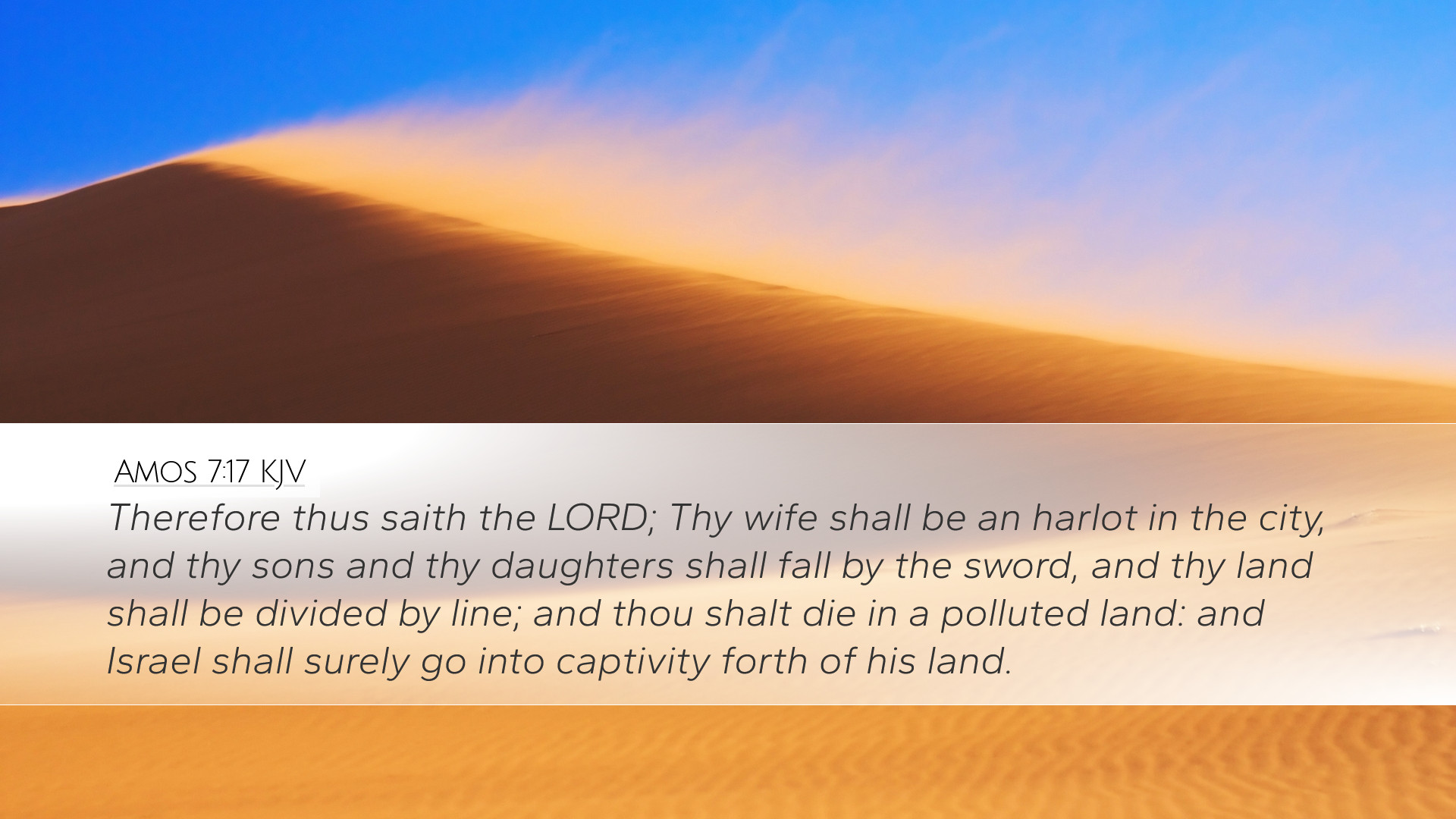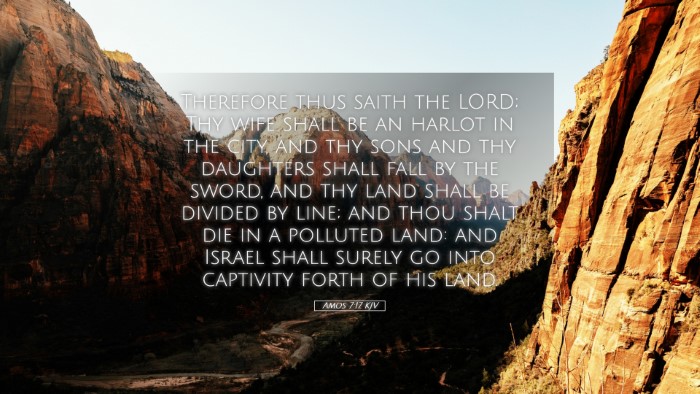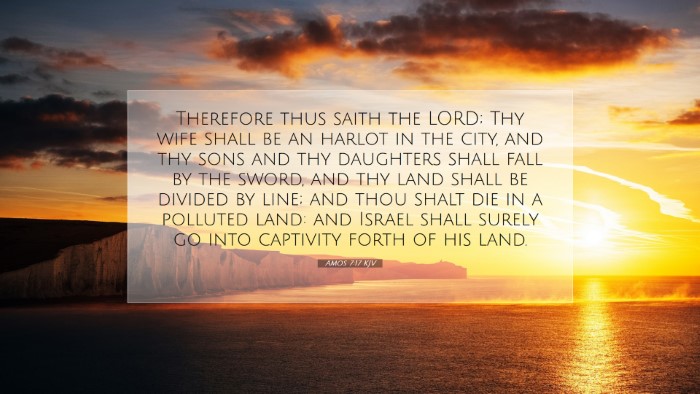Old Testament
Genesis Exodus Leviticus Numbers Deuteronomy Joshua Judges Ruth 1 Samuel 2 Samuel 1 Kings 2 Kings 1 Chronicles 2 Chronicles Ezra Nehemiah Esther Job Psalms Proverbs Ecclesiastes Song of Solomon Isaiah Jeremiah Lamentations Ezekiel Daniel Hosea Joel Amos Obadiah Jonah Micah Nahum Habakkuk Zephaniah Haggai Zechariah MalachiAmos 7:17
Amos 7:17 KJV
Therefore thus saith the LORD; Thy wife shall be an harlot in the city, and thy sons and thy daughters shall fall by the sword, and thy land shall be divided by line; and thou shalt die in a polluted land: and Israel shall surely go into captivity forth of his land.
Amos 7:17 Bible Commentary
Commentary on Amos 7:17
Amos 7:17 states: "Therefore thus says the Lord: Your wife shall be a harlot in the city, and your sons and daughters shall fall by the sword; your land shall be divided by a measuring line; you shall die in a defiled land; and Israel shall surely be led away captive from his own land." This verse serves as a somber and dire prophetic warning against the people of Israel, focusing particularly on the judgment that would come as a result of their sins.
Context of Amos’ Prophecy
In understanding this verse, it is vital to consider the broader context of the Book of Amos. Amos was a shepherd from Tekoa, called by God to prophesy to Israel during a time of prosperity but also of moral decay and idolatry. His messages are filled with calls to repentance and warnings of impending judgment. This particular prophecy in Amos 7:17 is directed at Amaziah, the priest of Bethel, who had opposed Amos and sought to silence his messages (Amos 7:10-13).
Insights from Public Domain Commentaries
Matthew Henry
Matthew Henry in his commentary emphasizes that the judgment pronounced in Amos 7:17 is both severe and instructive. He notes that the warnings made by Amos were not merely about physical repercussions but spoke to the spiritual state of Israel as well. Henry sees the reference to the wife being a harlot as indicative of the spiritual unfaithfulness of Israel—turning to other gods and breaking covenant relationships. He also suggests that the fate of the children falling by the sword symbolizes the loss of future generations and divine favor. He warns that such judgments are a consequence of rejecting God's prophets and His message.
Albert Barnes
Albert Barnes provides a rich theological perspective on this verse, expounding on the socio-political implications of the prophecy. He notes that the "measuring line" signifies a divine judgment where God delineates the boundaries of punishment upon Israel. Barnes highlights how the verse serves as a stark reminder of the consequences of sin—indicating that when a nation turns away from God, divine judgments will ensue. The statement about dying in a defiled land speaks to the hopelessness that comes from being cut off from the covenant community and the blessings tied to the land. For Barnes, the depth of these pronouncements underscores the seriousness of ignoring God's voice through His messengers.
Adam Clarke
Adam Clarke offers an extensive exegesis, noting the historical context of Israel's disobedience and the role of prophetic voices like Amos in revealing God's displeasure. Clarke comments that the image of the wife’s harlotry is particularly powerful; it suggests betrayal not just to the husband but to God Himself. He highlights that this judgment was not random but was in response to ongoing idolatry and a refusal to heed divine warnings. Clarke's insights stress that this verse isn't just about punishment; it's a call for self-reflection about the fidelity of individuals and nations to God's commands. He additionally emphasizes the emotional weight of these prophetic words and the burden Amos bore as a prophet of God.
Applications for Today
This commentary on Amos 7:17 provides significant insights for contemporary readers, especially pastors, theologians, and students of Scripture. There are several key applications that can be drawn from this verse:
- The Warning Against Idolatry: Just as Israel faced judgment for turning to other gods, modern believers must remain vigilant against the allure of contemporary idols—be it materialism, power, or societal approval.
- Accountability to Prophetic Voices: The opposition faced by Amos serves as a cautionary tale that highlights the importance of listening and responding to God's messengers today. The consequences of rejecting divine counsel can lead to dire outcomes.
- The Importance of Spiritual Fidelity: The imagery of unfaithfulness characterized by the harlot metaphor invites introspection regarding the fidelity of God's people in their relationship with Him. Faithfulness in worship and lifestyle is paramount.
- The Inevitability of Consequences: The prophecy reminds us that unrepentant sin leads to tangible consequences in community and personal lives, calling for a posture of humility and repentance.
Conclusion
Amos 7:17 stands as a powerful proclamation of divine judgment and a clarion call for fidelity to God. The insights drawn from historical commentaries such as those by Matthew Henry, Albert Barnes, and Adam Clarke equip us to approach this scripture with a reflective heart, seeking to understand our place within the narrative of redemption. Moreover, it challenges modern readers to examine their own lives and communities in the light of biblical truths, encouraging a lifestyle of adherence to God’s word amid a world that often promotes defiance against it.


